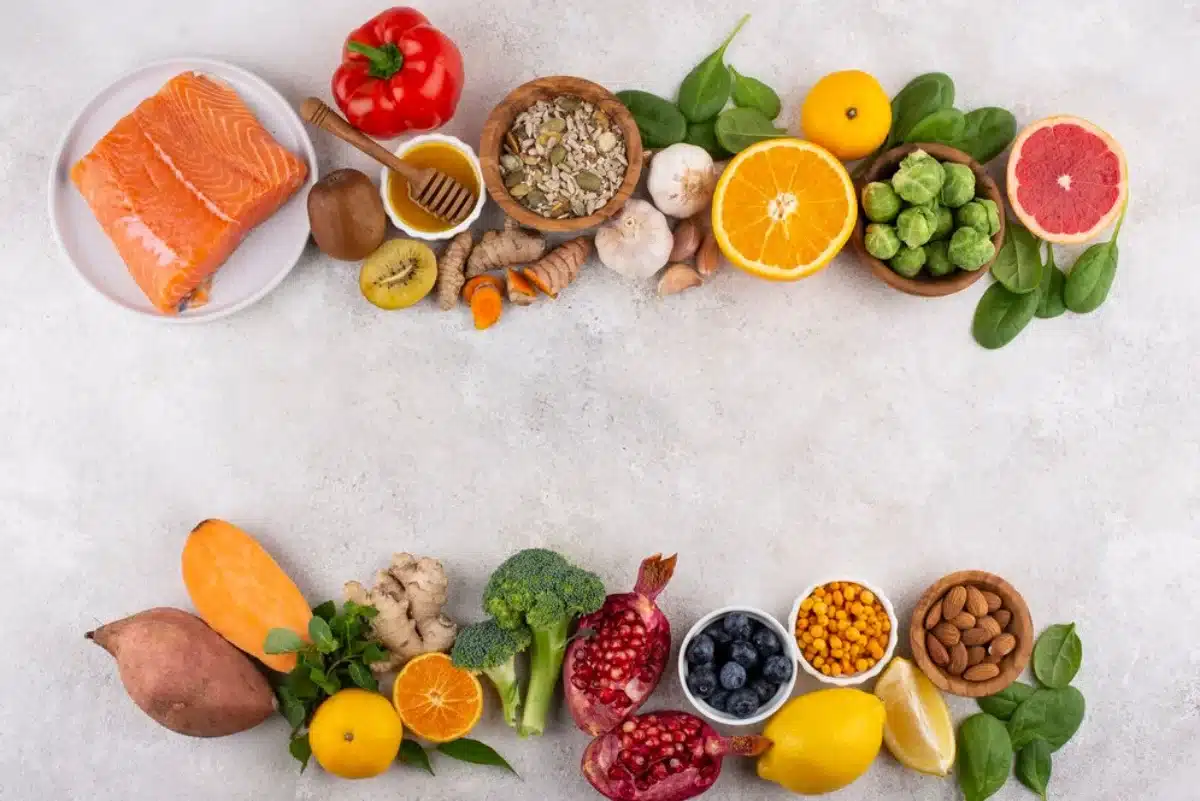
How to Get Enough Vitamins and Minerals Naturally
Vitamins and minerals are key for general well-being. They are crucial for bodily functions, help avoid deficiencies, and promote long-term health. Although supplements are common, the best way to get these nutrients is from a balanced diet rich in whole foods. Eating a well-balanced diet provides your body with all the nutrients it needs. It makes this happen organically and does not use synthetic options.
This quick-reference guide highlights the top natural sources of vitamins and minerals, provides practical advice for incorporating them into your diet, and provides guidelines for maintaining peak nutrition. Getting nutrients from food is key to boosting immunity, improving energy, or enhancing well-being.
Why Are Vitamins and Minerals Important?

Vitamins and minerals play a role in nearly every bodily function. They help with:
- Energy production – Converting food into usable energy
- Immune support – Strengthening defences against illness and infections
- Bone health – Keeping bones and teeth strong
- Cognitive function – Supporting memory and brain health
- Cell repair and growth – Ensuring proper body maintenance
Each vitamin and mineral has a specific function, and a deficiency in even one can lead to health problems. That’s why it’s essential to focus on a nutrient-rich diet rather than relying solely on supplements.
Pro Tip:
Aim for variety in your meals. A diverse diet ensures you get a broad spectrum of vitamins and minerals naturally.
Quick Guide: Natural Sources of Vitamins and Minerals
1. Vitamin A – Essential for Vision and Immune Health
Supports eye health, immune function, and cell growth.
Best Food Sources:
- Carrots
- Sweet potatoes
- Spinach
- Kale
- Liver
How to Include in Your Diet:
- Add spinach or kale to smoothies
- Roast sweet potatoes as a side dish
- Snack on carrots with hummus
2. Vitamin B Complex – Boosts Energy and Brain Function
Aids energy production, nerve function, and red blood cell formation.
Best Food Sources:
- Whole grains (brown rice, oats, quinoa)
- Eggs
- Dairy products
- Leafy greens
- Legumes (lentils, chickpeas, beans)
How to Include in Your Diet:
- Start your day with oatmeal or whole-grain toast
- Snack on boiled eggs
- Add lentil soup to your diet plan
Important Tip: If you suspect a deficiency, get a blood test to identify specific nutrient gaps instead of self-diagnosing or overusing supplements.
3. Vitamin C – A Powerful Antioxidant for Immunity
Supports immune health, collagen production, and iron absorption.
Best Food Sources:
- Citrus fruits (oranges, lemons, grapefruits)
- Bell peppers
- Strawberries
- Kiwi
- Tomatoes
How to Include in Your Diet:
- Drink fresh orange juice in the morning
- Add bell peppers to salads
- Snack on strawberries with Greek yoghurt
4. Vitamin D – The Sunshine Vitamin for Bone Health
Key for calcium absorption, bone strength, and immune function.
Best Food Sources:
- Fatty fish (salmon, mackerel, sardines)
- Egg yolks
- Fortified dairy products
- Mushrooms
- Sunlight exposure
How to Include in Your Diet:
- Eat grilled salmon with vegetables
- Have scrambled eggs for breakfast
- Spend at least 15-30 minutes in sunlight daily
5. Vitamin E – A Skin and Heart Health Booster
It works as an antioxidant, protecting cells and supporting heart health.
Best Food Sources:
- Almonds
- Sunflower seeds
- Spinach
- Avocados
- Olive oil
How to Include in Your Diet:
- Snack on almonds
- Drizzle olive oil over salads
- Blend avocados into smoothies
6. Vitamin K – Essential for Blood Clotting and Bone Health
Vital for blood clotting and bone metabolism.
Best Food Sources:
- Leafy greens (kale, spinach, Swiss chard)
- Broccoli
- Brussels sprouts
- Fermented foods
- Eggs
How to Include in Your Diet:
- Steam broccoli as a side dish
- Add kale to soups
- Eat fermented foods like kimchi
7. Iron – Supports Red Blood Cell Production
Essential for oxygen transport and preventing anaemia.
Best Food Sources:
- Red meat
- Lentils
- Spinach
- Pumpkin seeds
- Tofu
How to Include in Your Diet:
- Enjoy lentil soups and stews
- Add pumpkin seeds to yoghurt or salads
- Pair spinach with vitamin C-rich foods for better absorption
8. Magnesium – Supports Muscle and Nerve Function
Aids muscle relaxation, nerve function, and energy production.
Best Food Sources:
- Nuts (almonds, cashews)
- Dark chocolate
- Avocados
- Whole grains
- Bananas
How to Include in Your Diet:
- Treat yourself to dark chocolate
- Eat a banana with peanut butter
- Include nuts in breakfast bowls
9. Zinc – Boosts Immunity and Wound Healing
Supports immune function, wound healing, and cell division.
Best Food Sources:
- Shellfish (oysters, crab)
- Beef
- Pumpkin seeds
- Chickpeas
- Dairy products
How to Include in Your Diet:
- Snack on roasted pumpkin seeds
- Add chickpeas to salads
- Enjoy Greek yoghurt with fruit
To Maintain a Nutrient-Rich Diet
- Eat the Rainbow – Include colorful fruits and vegetables daily.
- Limit Processed Foods – Choose whole, natural foods over ultra-processed options.
- Stay Hydrated – Proper hydration helps with nutrient absorption.
- Pair Foods Wisely – Some nutrients, like iron and vitamin C, work better together.
- Cook Smart – Avoid overcooking vegetables to retain their vitamins.
Secret Tip:
Plan meals to ensure you get a balanced mix of vitamins and minerals daily.
Frequently Asked Questions About Vitamins and Minerals

- Can I get all my vitamins and minerals from food alone?
- Do I need supplements if I eat a healthy diet?
- What’s the best way to absorb nutrients from food?
- How can I tell if I have a vitamin deficiency?
Yes, with a well-balanced diet rich in whole foods, you can meet your nutrient needs without supplements.
Not necessarily. However, specific individuals (e.g., pregnant women, older adults, and vegans) may benefit from targeted supplementation.
Pair foods wisely, avoid overcooking vegetables, and eat various whole foods.
Symptoms vary but may include fatigue, hair loss, weakened immunity, or slow wound healing. A healthcare provider can test for deficiencies.
Find the Right Balance

A healthy, whole-food-oriented diet can provide plenty of essential nutrients. You can produce vitamins on your own. Opt for smart, vitamin-rich meals. Nature provides your body with the nutrients it requires.
Start with whole foods today. You’ll consume vitamins and minerals in their natural state.
What are some of your favourite nutrient-dense foods? Share your thoughts in the comments below!


